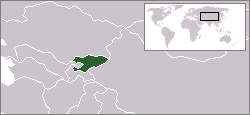LGBT rights in Kyrgyzstan
Lesbian, gay, bisexual, and transgender (LGBT) persons in Kyrgyzstan face legal challenges not experienced by non-LGBT residents. Both male and female same-sex sexual activity are legal in Kyrgyzstan, but same-sex couples and households headed by same-sex couples are ineligible for the same legal protections available to opposite-sex married couples.[1]
 | |
| Status | Legal since 1998[1] |
| Gender identity | Transgender people allowed to change gender following surgery |
| Military | No |
| Discrimination protections | None |
| Family rights | |
| Recognition of relationships | No recognition of same-sex unions |
| Restrictions | Constitutional ban since 2016 |
| Adoption | No |
LGBT people tend to face frequent discrimination and harassment in the country. Homophobia is widespread in Kyrgyzstan, and is often accompanied by violence. Kyrgyzstan has been described as an increasingly hostile environment when it comes to LGBT rights.[2]
Law regarding same-sex sexual activity
Consensual sexual acts between persons of the same sex have been legal in Kyrgyzstan since 1998.[1]
Recognition of same-sex relationships
Kyrgyzstan does not recognise same-sex marriage or civil unions.
Since 2016, the Kyrgyz Constitution has explicitly banned same-sex marriage.[3]
Gender identity and expression
Transgender people are allowed to change legal gender in Kyrgyzstan, but require undergoing sex reassignment surgery. The first such surgery was performed in Bishkek in January 2014.[4]
Living conditions
Kyrgyz society is socially conservative. Homosexuality tends to be viewed as immoral or disordered. As a result, LGBT people feel the need to remain discreet in the country and keep their sexual orientation a secret. A 2017 survey by Kyrgyz Indigo, a local LGBT advocacy group, found that 84% of LGBT Kyrgyzs had experienced physical violence and 35% sexual violence.
Before the 2010s, ignorance about LGBT rights resulted in a somewhat "liberal" scene and safe haven for LGBT people, especially in the capital Bishkek. In 2014, however, the Government launched a series of legal reforms including an "anti-gay propaganda law". This has led to the LGBT community being thrust into the spotlight, and a near 300% increase in attacks against LGBT people.[5]
Bishkek's only gay bar, London, had to shut down in 2017.[3]
According to 2018 reports, police officials have been blackmailing LGBT people on social media and dating sites, requesting between 5000 and 30,000 soms (70 to 500 U.S. dollars).[2]
Activism
There are multiple LGBT groups in Kyrgyzstan, including Kyrgyz Indigo (Kyrgyz: Кыргыз Индиго) and Labrys (Лабрис), founded in 2004. Labrys staff also conduct training for doctors and psychiatrists on sexual orientation and gender identity.
On 8 March 2019, a peaceful march of about 400 people occurred in the capital Bishkek. Although the march was meant to commemorate the International Women's Day, it saw a heavy bent towards LGBT issues, which the media then dubbed Kyrgyzstan's "first gay pride march". The event, however, drew notable controversy, especially from members of parliament who expressed murderous threats to the participants. MP Jyldyz Musabekova wrote on Facebook that "the men who do not want to have children and the girls who do not want to pour tea...must not only be cursed, they must be beaten". She was quickly condemned by other deputies.
Human rights groups and the organisers defended the march and the presence of LGBT rainbow flags. Bektour Iskender, founder of the popular Kloop news website and a participant in the march, said, "I think it's very cool that the LGBT community came on the march, because this is also related to the rights of women if we are talking about lesbians and transgender girls who face tremendous violence in Kyrgyzstan".[6][7] LGBT activists described the event as "a turning point".[8]
Freedom of expression
In 2014, a bill was introduced to the Parliament to criminalise expression which creates "a positive attitude toward non-traditional sexual relations, using the media or information and telecommunications networks."[9] On 15 October, the bill passed its first reading, in a 79-7 vote. It has received wide international opposition, and has been delayed multiple times. In 2016, it passed its second reading. It now awaits a third final reading.[5]
Summary table
| Same-sex sexual activity legal | |
| Equal age of consent | |
| Anti-discrimination laws in employment only | |
| Anti-discrimination laws in the provision of goods and services | |
| Anti-discrimination laws in all other areas (incl. indirect discrimination, hate speech) | |
| Same-sex marriages | |
| Recognition of same-sex couples | |
| Stepchild adoption by same-sex couples | |
| Joint adoption by same-sex couples | |
| LGBT people allowed to serve openly in the military | |
| Right to change legal gender | |
| Access to IVF for lesbians | |
| Commercial surrogacy for gay male couples | |
| MSMs allowed to donate blood |
References
- "State-sponsored homophobia – A world survey of laws: Criminalisation, protection and recognition of same-sex love" (PDF). Archived from the original (PDF) on 19 July 2013. Retrieved 8 June 2013.
- Exclusive: Police are ‘blackmailing gay and bisexual men’ in Kyrgyzstan
- Curtain Falls On Bishkek's Lone LGBT Club Amid Worsening Atmosphere
- First Kyrgyz Sex-Change Surgery A 'Success'
- Katie Arnold (19 October 2017). "'All of us will be victims at some point': why Bishkek's only gay club closed". The Guardian.
- Pete Baumgartner (16 March 2019). "Rainbow Rage: Kyrgyz Rail Against LGBT Community After Central Asia's 'First' Gay-Pride March". Radio Free Europe/Radio Liberty.
- ""Лабристин" укук коргоочулары аялдардын укугу үчүн жөө жүрүштө эмне үчүн ЛГБТ да болгонун түшүндүрүп беришти". Kloop (in Kyrgyz). 11 March 2019.
- Margot Buff (1 July 2019). "'If Not Now, When?' LGBT Movement Gains Momentum in Kyrgyzstan". Radio Free Europe/Radio Liberty.
- Kyrgyzstan Considers 'Gay Propaganda' Ban
- Masci, David (11 February 2014). "Gay rights in Russia and the former Soviet republics". Pew Research Center. Retrieved 11 December 2016.